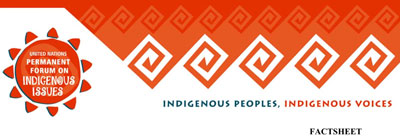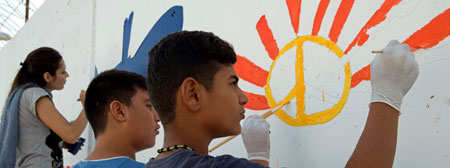
UN Permanent Forum on Indigenous Issues >>
The rights of indigenous peoples must be protected and respected. | To read the full message by UNICEF, UNFPA and UNESCO’s Asia Pacific Regional Directors calling on countries to give greater priority to the fulfillment of the rights of indigenous peoples and to ensure that they are not left behind in efforts to achieve the Sustainable Development Goals, click here >>
In a message to mark the International Day of Indigenous Peoples, UNICEF, UNFPA and UNESCO’s Asia Pacific Regional Directors call on countries to give greater priority to the fulfillment of the rights of indigenous peoples and to ensure that they are not left behind in efforts to achieve the Sustainable Development Goals (SDGs).
There are around 370 million indigenous peoples worldwide, living across 90 countries and representing 5000 diverse cultures. They make up less than 5 per cent of humanity, yet represent around 15 per cent of the world’s poorest people. Two thirds of the world’s indigenous peoples live in Asia and the Pacific. They include groups often referred to as tribal peoples, hill tribes, adivasis, janajati, orang asli, aboriginal or native.
Indigenous peoples make significant contributions to humanity’s cultural, intellectual and economic wealth. Across Asia and the Pacific, they are sharing essential knowledge and skills in conservation and the sustainable use of land, forests and natural resources – key to achieving the Sustainable Development Goals.
Yet many indigenous peoples remain unprotected and unrecognized. They face forced assimilation, exclusion and systemic discrimination. Their cultures, stories and knowledge are in danger of being lost. Indigenous children, in particular, are often deprived of opportunities to fulfill their full potential. The promise of the 2030 Agenda for Sustainable Development is to ensure a life of dignity for all, leaving no one behind, so special attention must be paid to the needs and rights of indigenous peoples.
The International Day of Indigenous Peoples, celebrated every year on 9 August, is an important opportunity for countries and societies around the world to learn about, and commit themselves to the realization of the rights of indigenous peoples. […]
Source: Unicef, “The rights of indigenous peoples must be protected and respected”
URL: https://www.un.org/en/events/indigenousday/pdf/IDWIP%20Joint%20Statement%20FINAL.pdf
Date visited: 8 March 2020
[Bold typeface added above for emphasis]
“The report titled, Who Tells Our Stories Matters: Representation of Marginalised Caste Groups in Indian Newsrooms, was released on 2 August. It studied the representation of people from different caste groups in the Indian media to document ‘who has a seat at the table and whose voice has a chance of being heard.’ It found that the ‘Scheduled Tribes are almost entirely absent, whereas the Scheduled Castes are represented mostly by social activists and politicians rather than journalists. English newspapers are worse than Hindi on representing Dalit, Adivasi writers.” – The Caravan, 3 August 2019 >>

International Day of the World’s Indigenous People (9 August) >>
“The United Nations stands ready to support all initiatives aimed at realizing the rights and aspirations of indigenous peoples.” — UN Secretary-General António Guterres| Learn more >>
Why Do We Mark International Days?
International days are occasions to educate the public on issues of concern, to mobilize political will and resources to address global problems, and to celebrate and reinforce achievements of humanity. The existence of international days predates the establishment of the United Nations, but the UN has embraced them as a powerful advocacy tool. More information available here.
Find up-to-date information provided by, for and about Indian authors, researchers, officials, and educators
List of web portals covered by the present Custom search engine
Ashoka Trust for Research in Ecology and the Environment (ATREE) – www.atree.org
Freedom United – www.freedomunited.org
Government of India (all websites ending on “.gov.in”)
Kalpavriksh Environmental Action Group – https://kalpavriksh.org
Shodhganga (a reservoir of Indian theses) – https://shodhganga.inflibnet.ac.in
Survival International – www.survivalinternational.org
UCLA Digital Library – https://digital.library.ucla.edu
Unesco – https://en.unesco.org
Unesco digital library – https://unesdoc.unesco.org
Unicef – www.unicef.org
United Nations – www.un.org/en
Video Volunteers – www.videovolunteers.org
WorldCat (“the world’s largest library catalog, helping you find library materials online”) – https://worldcat.org
To search Indian periodicals, magazines, web portals and other sources safely, click here. To find publishing details for Shodhganga’s PhD search results, click here >>
Search tips
Combine the name of any particular state, language or region with that of any tribal (Adivasi) community.
Add keywords of special interest (music, poetry, dance just as health, sacred grove and biodiversity); learn about the rights of Scheduled Tribes such as the “Forest Rights Act” (FRA); and the United Nations “Declaration on the Rights of Indigenous Peoples”, “Universal Declaration of Human Rights”, “women’s rights”, or “children’s right to education”.
Ask a question that includes “tribal” or “Adivasi”, for instance: “Adivasi way of life better?” (or “tribal way of life worse?”)
Specify any particular issue or news item (biodiversity, bonded labour and human trafficking, climate change, ecology, economic development, ethnobotany, ethnomedicine, global warming, hunter-gatherers in a particular region or state, prevention of rural poverty, water access).
For official figures include “scheduled tribe ST” along with a union state or region: e.g. “Chhattisgarh ST community”, “Himalayan tribe”, “Scheduled tribe Tamil Nadu census”, “ST Kerala census”, “Particularly Vulnerable Tribal Group Jharkhand”, “PVTG Rajasthan”, “Adivasi ST Kerala”, “Adibasi ST West Bengal” etc.
In case the Google Custom Search window is not displayed here try the following: (1) toggle between “Reader” and regular viewing; (2) in your browser’s Security settings select “Enable JavaScript” | More tips >>
Note: hyperlinks and quotes are meant for fact-checking and information purposes only | Disclaimer >>
Some clarifications on caste-related issues by reputed scholars >>